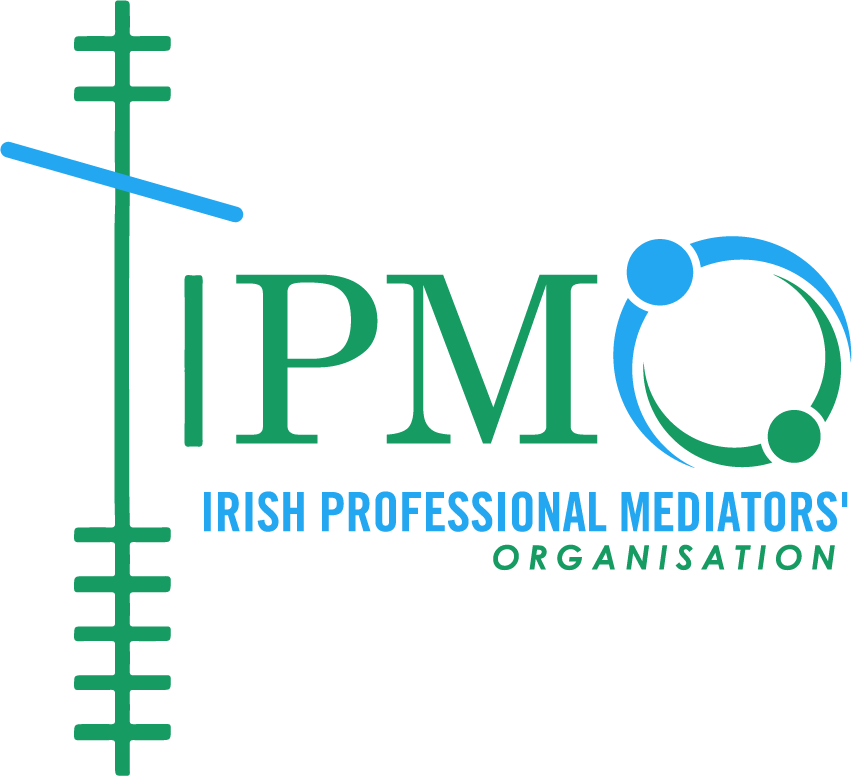| A membership body for Professional Mediators in Ireland |
What is Mediation?
Mediation creates a platform for non-adversarial discussion and, hopefully, leads to a better understanding of the nature of conflict such that similar disputes could be avoided in future. The Mediation Act 2017 is the primary piece of legislation for mediation in Ireland, providing statutory protection for the confidentiality of mediation.
Practice Areas
IPMO Mediators work in "practice areas", which are grouped based on the nature of dispute being resolved. Examples are described below, and it is possible that practice areas may overlap.
FAMILY MEDIATION
Family Mediation aims to resolve disputes between family members who are in dispute. The issues in dispute may include; parenting or financial arrangements, agreeing terms for a legal separation, divorce, a cohabitants agreement or a dissolution of a Civil partnership; resolving probate disputes where a will has been contested or farm family succession disputes; assisting parties to agree arrangements for the care of elderly relatives "Elder Mediation"; or disputes that arise between adult family members.
Family mediation may also overlap with Civil & Commercial Mediation in commercial disputes involving family members. A typical example would include disputes between owners of a family business. This differs from civil & commercial mediations between otherwise unconnected parties because family members will likely hope the relationships between the parties can be improved, and restored if possible.
WORKPLACE MEDIATION
Workplace Mediation aims to resolve disputes between employees in an organisation. Workplace disputes can arise where there are personal differences or people have problems working together, where a working relationship has broken down, or where issues have arisen from a grievance and disciplinary procedure. Workplace mediation may involve more than 2 parties in dispute and may also address situations where there are industrial relations issues that have not been referred through statutory dispute resolution processes.
CIVIL & COMMERCIAL MEDIATION
Civil & Commercial mediation aims to resolve commercial disputes between businesses and individuals. Depending on the nature of the dispute, it may be business-to-business or business-to-individual. Examples of Civil & Commercial mediation include: facilitating settlements for non-payment of goods or services, breach-of-contract disputes, personal injury actions or resolving shareholder/partner disputes. Commercial disputes may involve 2 parties (bipartite) or many parties (multipartite), and encompass everything from single issue mediations to complex discussions with many parties in different jurisdictions. It is an invaluable tool for the resolution of International Commercial Disputes.
Civil & Commercial mediation is often attempted when litigation is either imminent or underway. It provides a confidential forum for disputants to consider settlement terms without prejudice to their legal rights and entitlements should the dispute go to a court hearing. It is extremely flexible in that settlement terms can be agreed which are beyond what a court could award but which uniquely and sensitively address the interests of the concerned parties. Where litigation has already commenced, the judge may invite the parties to try mediation, and where a mediation settlement is reached it may be provided to the court for ruling and subsequent enforcement if necessary.
Sometimes, Civil & Commercial mediation will overlap with Family Mediation where the parties in dispute are related.
COMMUNITY MEDIATION
Community Mediation aims to resolve disputes between individuals and groups within a community. Common examples of community mediation include neighbour dispute mediation for homeowners, private tenants & local authority tenants, resolution of disputes between members of a residents association, resolution of disputes between members of ethnic groups, or between ethnic groups and other communities.
Community mediation assists members of a community to self-determine the resolution of their dispute and to avoid lengthy and costly litigation. Community mediators should ideally reflect the diversity of the community they are serving. Where mediating a dispute involving an ethnic group or groups, community mediators should have awareness-of and sensitivity-to their customs.
Depending on the nature of the dispute, community mediation may be provided on a low-cost or free basis, by voluntary mediators. There is sometimes an overlap between Community Mediation and Civil & Commercial Mediation; for example, mediation between a local community or representative groups and a commercial entity that wishes to develop property in the area.
VICTIM OFFENDER MEDIATION
As per the Probation Service of Ireland, Victim Offender Mediation is a branch of Restorative Justice;
"This is a process which provides an opportunity for victims and offenders to meet in a safe, controlled setting, assisted by a trained mediator. After preparing for the meeting independently with each party, the mediator facilitates a discussion between the victim and offender for the purpose of addressing/repairing the harm caused. The Court may request Victim Offender Mediation post-sentence, but participation of the service user is voluntary."
IPMO's Victim Offender Committee includes experienced mediation and Restorative Justice practitioners.
How do I know my IPMO mediator has the correct skills & expertise?
Under Section 8 (1) (b) of the Mediation Act 2017, Mediators in Ireland must furnish clients with details of their qualifications; training and experience; and continuing professional development (CPD) training.
IPMO identifies training and other practice requirements for our mediators to ensure that they can deliver an expert service in whatever practice area they specialise in. Some experienced mediators may have expertise in more than one practice area, which is typically described in their mediator profile within the IPMO Directory.
Mediators with expertise in multiple practice areas will often develop a niche in resolving categories of disputes that encompass those areas, for examples Family Business Disputes or Developer-Community Disputes.
Collectively, our Committee Members have proficiency in all types of mediation and practice areas. IPMO harnesses this wealth of real-world knowledge to deliver practice guidelines and learning supports to ensure our mediators can offer a high quality service to their clients.
Upcoming Events
| Featured Member |
